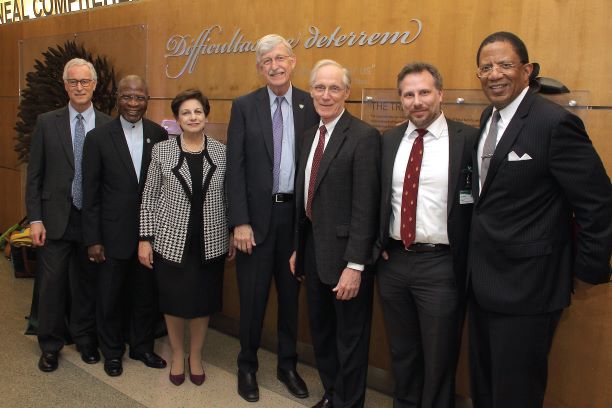 Last week, the School of Medicine had the unique opportunity to host NIH director Francis Collins, M.D., Ph.D., on March 5 and 6 for an impactful visit and exceptional lecture.
Last week, the School of Medicine had the unique opportunity to host NIH director Francis Collins, M.D., Ph.D., on March 5 and 6 for an impactful visit and exceptional lecture.
Collins, a physician-geneticist noted for his landmark discoveries of several disease genes, arrived in Birmingham on Thursday afternoon and attended an evening reception held in his honor. Reception guests included UAB deans, department chairs, center and institute directors, CCTS network partners, and senior leaders from the School of Medicine Dean’s office and the Health System. After, Collins was treated to dinner by President Watts and UAB leadership at the Woodward House.
On Friday, Collins had breakfast with School of Medicine junior faculty and ate lunch with graduate students, post docs, and MSTP students. Throughout the day, he participated in research presentations and discussions with Smita Bhatia, M.D., MPH, and Bruce Korf, M.D., Ph.D., as well as a conversation about strategic research leadership with Richard Whitley, M.D., and Robert Kimberly, M.D. Perhaps the most galvanizing appointment in his itinerary was the keynote address he delivered to a standing-room-only crowd in Margaret Cameron Spain Auditorium.
His lecture, “Exceptional Opportunities for Biomedical Research,” began by highlighting last year’s NIH funding at UAB, which totaled in at just over $328 million. He recognized the importance of the NIH’s particular investment in the UAB Center for Clinical and Translational Sciences, naming the significance of their focus on cardiometabolic, vascular, and cancer-related diseases.
Additionally, Collins addressed COVID-19 and its worldwide impact. He communicated the NIH’s various coronavirus efforts, especially their preparation in basic research. For example, they now know the virus’s structure and its aggressive ability to get inside a human cell. Similarly, the NIH is currently focused on animal model development and providing resources for COVID-19 researchers. The NIH is, above all, focused on diagnostics, therapeutics, and vaccines. Here, Collins acknowledged Whitley’s influential work with the drug remdesivir. Collins noted that several peer-reviewed journals cite remdesivir’s effectiveness and could be a “very appropriate way to try to treat people who have been infected.”
Moreover, in his keynote address, Collins forecasted 10 predictions in medical research for the next decade. Among those predictions were: dramatic advancement of individual human cell analysis, the ability to progressively identify brain cell types and circuits, and spectacular progress in diagnosis and treatment of rare diseases through harnessing CRISPR-Cas and other gene editing tools. He also discussed the All of Us Research Program, which aims is to build the most diverse health database in history. Finally, Collins anticipated that in the next 10 years, medical research teams will have created a representative, vibrant, and innovative scientific workplace, free of racial and gender discrimination and enforcing zero tolerance for sexual harassment. Collins benevolently stated that “manels” (men-only panels) were a thing of the past and no longer acceptable.
If you were unable to attend the lecture nor watch it live, click here to view the recording.
You can follow Collins on twitter at this handle @NIHDirector and you can read his blog here. His latest photo album features his visit to the School of Medicine!
